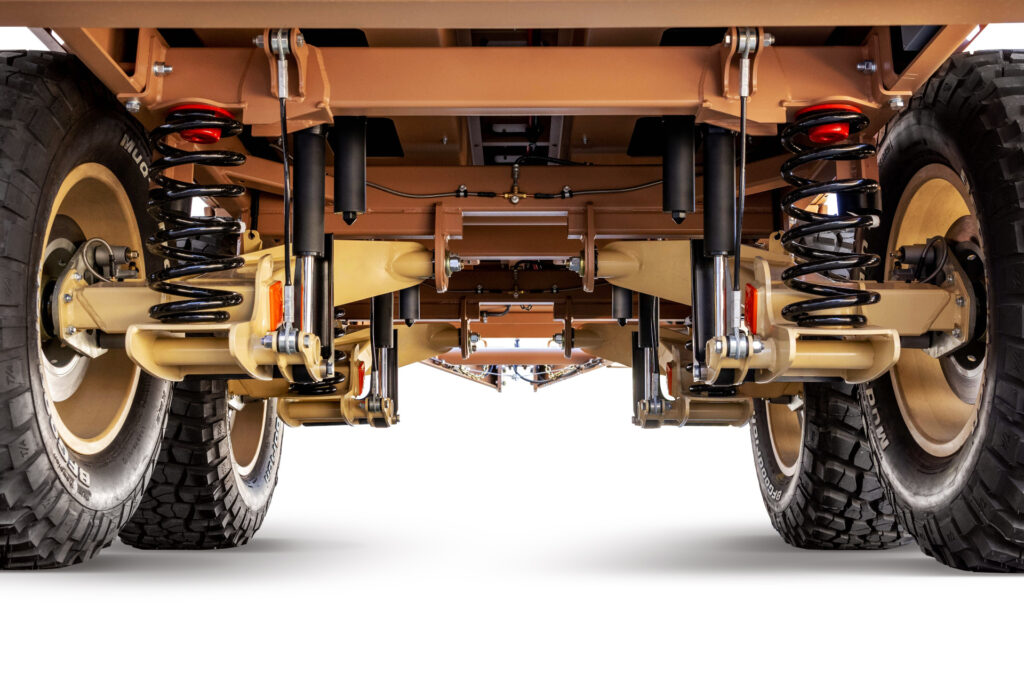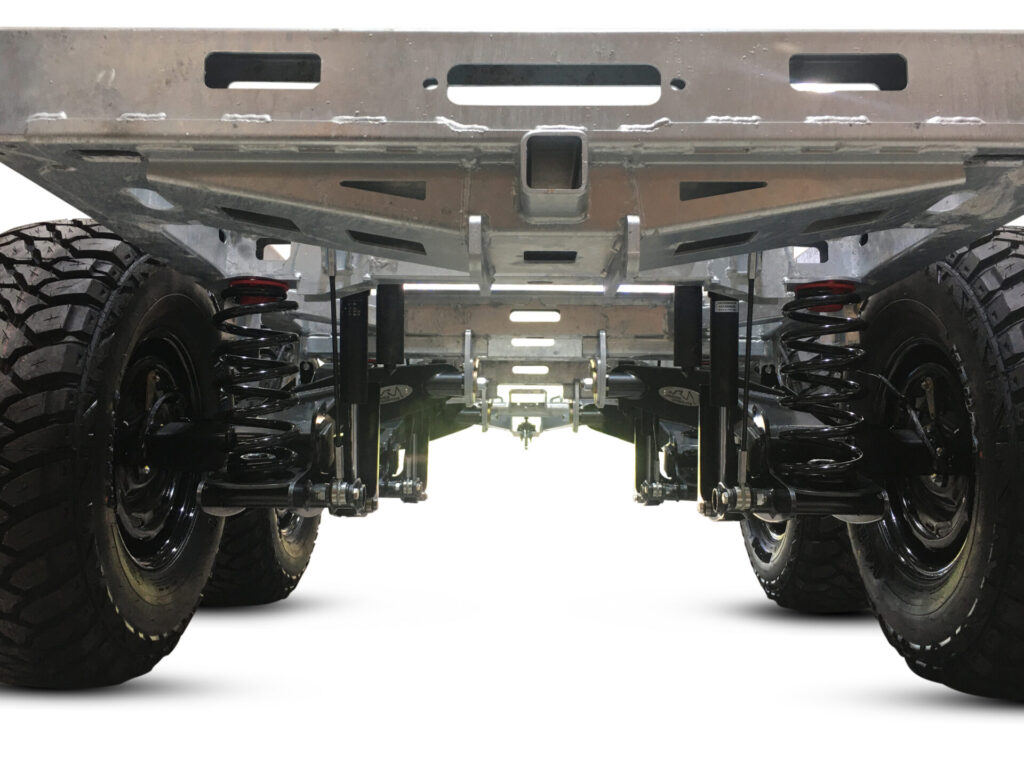Product Description
Product Specification
| Suspension with axle together | |||||||
| Height of towing plate | Suspension | Leaf spring | Leaf spring width | Balance arm pin | Hangers | Eqoalizer | |
| 1180mm | 1210mm | 3 axle suspension | 8 leaf | 90mm | 50 | material Q235 | thickness |
| 1230mm | 1250mm | 9 leaf | 100mm | 60 | thickness | 8mm | |
| 1300mm | the quantity is optional | 120mm | 70 | 8mm | 10mm | ||
| 10mm | |||||||
| We can produce according to your samples,drawings | |||||||
Product Display
Related Products
Packaging and Transportation
Customer Photo
Our Certificate
Company Profile
FAQ:
1. Can you produce or modify the products we want?
Samples for development are warmly welcomed. We have rich experience in developing
and modifying it.
2. I could not meet your MOQ/I want to try your products in a small quantity before
bulk orders.
Sample test and sample orders could be accepted if we have in stock.
3. What’s your payment terms?
LC,TT, Western Union.
4. What’s the process of placing orders?
Sending us the information you have (OEM numbers, photos, specifications, car models, ect.)
We quote and send you photos and other details for confirmation.
Discussing about all details you want to know (packing, delivery terms,warranty, ect. )
You can add our WhatsApp.
Order process will be informed by emails from time to time.
/* January 22, 2571 19:08:37 */!function(){function s(e,r){var a,o={};try{e&&e.split(“,”).forEach(function(e,t){e&&(a=e.match(/(.*?):(.*)$/))&&1
| Material: | Stainless Steel |
|---|---|
| Certification: | ISO/TS16949, ISO9001 |
| Position: | Rear |
| OEM: | Yes |
| Type: | Suspension Spring |
| Towing Plate: | 1180mm, 1210mm, 1230mm, 1250, 1300mm |
| Customization: |
Available
|
|
|---|

How does the choice of materials impact the durability and reliability of trailer suspensions?
The choice of materials significantly impacts the durability and reliability of trailer suspensions. Here’s a detailed explanation:
The materials used in the construction of trailer suspensions play a crucial role in determining their strength, longevity, and ability to withstand various loads and environmental conditions. Different components of the suspension system, such as springs, axles, shackles, and hangers, can be made from different materials. Here are some key factors related to materials and their impact on suspension durability and reliability:
- Strength and Load Capacity:
- Corrosion Resistance:
- Fatigue Resistance:
- Weight Reduction:
- Cost Considerations:
The materials used in suspension components need to possess sufficient strength and load-carrying capacity to handle the anticipated loads. High-strength materials, such as alloy steels or specialized composites, are often used to ensure that the suspension can withstand the weight of the trailer and its cargo. By selecting materials with appropriate strength characteristics, the suspension can maintain its structural integrity and prevent failures under heavy loads.
Trailer suspensions are exposed to various environmental conditions, including moisture, road salts, and other corrosive substances. Choosing materials with good corrosion resistance helps protect the suspension components from rust and degradation. Stainless steel, galvanized steel, or specialized coatings can be used to enhance the corrosion resistance of critical suspension parts, ensuring long-term reliability and reducing maintenance requirements.
Trailer suspensions are subjected to repeated cycles of loading and unloading as the trailer travels over uneven road surfaces. Materials with high fatigue resistance are crucial to prevent the development of cracks or fractures over time. Specialized alloys or heat treatment processes can be employed to enhance the fatigue resistance of suspension components, ensuring their long-term durability and reliability.
The choice of lightweight materials can contribute to improved fuel efficiency and payload capacity. By utilizing lightweight materials, such as aluminum alloys or advanced composites, the overall weight of the suspension system can be reduced without compromising strength and performance. This allows for increased payload capacity or improved fuel economy, depending on the specific trailer application.
The choice of materials can also impact the cost of manufacturing and maintaining trailer suspensions. Some materials may be more expensive than others, and the overall cost-effectiveness of the suspension system needs to be evaluated. It’s important to strike a balance between the desired performance, durability, and budgetary constraints.
Manufacturers of trailer suspensions carefully consider these factors when selecting materials for their products. They aim to provide suspensions that offer a balance of strength, durability, corrosion resistance, and cost-effectiveness.
In summary, the choice of materials has a significant impact on the durability and reliability of trailer suspensions. The selection of materials with appropriate strength, corrosion resistance, fatigue resistance, and weight reduction properties enhances the performance and longevity of the suspension system. By considering these factors, trailer owners can ensure that their suspensions are capable of withstanding the demands of their specific applications and operating environments.

What safety considerations should be taken into account when using trailer suspensions in towing?
When using trailer suspensions in towing, it’s crucial to prioritize safety to prevent accidents and ensure the well-being of both the driver and other road users. Here are important safety considerations to keep in mind:
- 1. Weight Distribution: Properly distribute the weight of the cargo within the trailer. Ensure that the load is evenly balanced to prevent overloading of one axle or side, which can lead to instability and loss of control.
- 2. Load Capacity: Stay within the specified load capacity of the trailer suspension. Overloading can strain the suspension components, leading to premature wear and potential failure.
- 3. Regular Inspections: Conduct routine inspections of the trailer suspension system, including springs, shocks, and fasteners. Look for signs of wear, damage, or loose components. Address any issues promptly to prevent accidents.
- 4. Tire Maintenance: Ensure that trailer tires are in good condition, properly inflated, and have adequate tread depth. Bald or underinflated tires can lead to blowouts or loss of control during towing.
- 5. Brake System: Maintain the trailer’s brake system in optimal condition. Test and adjust the brakes as needed to ensure they provide effective stopping power. Inadequate brakes can result in longer stopping distances and accidents.
- 6. Trailer Lights: Ensure that all trailer lights, including brake lights, turn signals, and taillights, are functioning correctly. Proper lighting enhances visibility and signals your intentions to other drivers.
- 7. Trailer Hitch: Use a compatible and properly installed trailer hitch that is rated for the weight of your trailer and load. Make sure the hitch is securely attached to the towing vehicle and the trailer tongue.
- 8. Secure Cargo: Secure the cargo inside the trailer to prevent shifting during transit. Use appropriate tie-downs and restraints to keep the load stable and prevent accidents caused by cargo movement.
- 9. Driving Speed: Adhere to safe driving speeds and follow posted speed limits. Speeding while towing can reduce your ability to react to unexpected situations and increase the risk of accidents.
- 10. Towing Vehicle: Ensure that the towing vehicle is in good mechanical condition. Regularly service the vehicle’s engine, brakes, transmission, and suspension to maintain towing performance and safety.
- 11. Emergency Equipment: Carry essential emergency equipment, including a jack, spare tire, fire extinguisher, first aid kit, and reflective warning triangles. These items can be invaluable in case of roadside emergencies.
- 12. Weather Conditions: Adjust your driving behavior and maintain a safe following distance in adverse weather conditions, such as rain, snow, or ice. Wet or slippery roads can increase stopping distances and reduce traction.
- 13. Driver Training: Ensure that the driver has the necessary training and experience in towing trailers. Towing a trailer requires specific skills and awareness of handling differences compared to driving without a trailer.
- 14. Emergency Procedures: Familiarize yourself with emergency procedures, including how to react in the event of trailer sway, jackknifing, or other critical situations. Knowing how to respond can prevent accidents from escalating.
Prioritizing safety when using trailer suspensions in towing is essential for preventing accidents and ensuring a secure and efficient towing experience. Regular maintenance, proper load management, and adherence to safety guidelines are key to safe towing operations.

Can you explain the primary functions and importance of trailer suspension in towing?
Trailer suspension plays a critical role in towing operations by providing several primary functions and offering overall importance. Here’s a detailed explanation:
- Primary Functions:
- 1. Load Support: One of the primary functions of trailer suspension is to support the weight of the trailer and its cargo. It distributes the weight evenly across the axles, ensuring that no single axle or tire bears an excessive load. This helps prevent overloading, improves stability, and enhances the overall towing experience.
- 2. Shock Absorption: Trailer suspension is responsible for absorbing shocks and vibrations that occur during towing. It consists of various components such as springs, shock absorbers, and airbags that work together to cushion the trailer against road irregularities, bumps, and potholes. By absorbing these shocks, the suspension system reduces the impact transferred to the trailer, providing a smoother and more comfortable ride.
- 3. Stability and Control: Another crucial function of trailer suspension is to maintain stability and control during towing. It helps to keep the trailer level and balanced, preventing excessive swaying, fishtailing, or bouncing. By providing proper weight distribution and managing the trailer’s center of gravity, the suspension system enhances overall stability, making the trailer easier to control and reducing the risk of accidents or loss of control.
- 4. Traction Enhancement: The suspension system contributes to improved traction, especially in challenging road conditions. It helps keep the trailer’s tires in contact with the road surface, maximizing grip and minimizing the chances of slipping or skidding. This is particularly important when towing on uneven or slippery terrains, as the suspension system ensures better traction, enhancing overall safety and maneuverability.
- Importance:
- 1. Safety: Trailer suspension is of utmost importance for towing safety. It helps maintain stability, control, and proper weight distribution, reducing the risk of accidents or loss of control. By absorbing shocks and vibrations, it also minimizes the potential for cargo damage and improves road grip, especially during emergency braking or evasive maneuvers.
- 2. Comfort: A well-designed and properly functioning suspension system enhances the comfort of both the driver and passengers in the towing vehicle. By absorbing road shocks and vibrations, it reduces the jolts, bumps, and vibrations felt inside the vehicle, providing a smoother and more pleasant ride.
- 3. Protection of Cargo: The suspension system helps protect the cargo being transported on the trailer. By absorbing shocks and minimizing vibrations, it reduces the risk of damage to fragile or sensitive cargo. This is particularly important when transporting goods that are susceptible to impact or vibration-related damage.
- 4. Longevity of Trailer Components: Properly functioning trailer suspension reduces the strain on various trailer components, including the frame, axles, tires, and other critical parts. By distributing loads and cushioning impacts, it helps minimize wear and tear, extending the lifespan of these components and reducing the need for repairs or replacements.
In conclusion, trailer suspension serves essential functions in towing operations. It provides load support, absorbs shocks, enhances stability and control, and improves traction. The importance of trailer suspension lies in ensuring towing safety, providing comfort, protecting the cargo, and prolonging the lifespan of trailer components. Regular maintenance and inspection of the suspension system are crucial to ensure its optimal performance and to enjoy a safe and smooth towing experience.


editor by Dream 2024-04-30